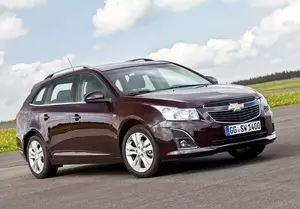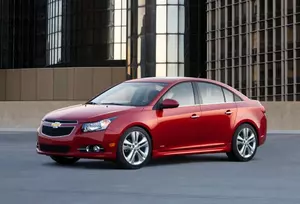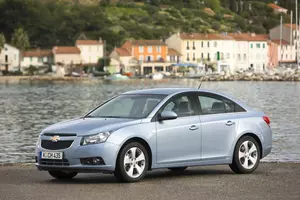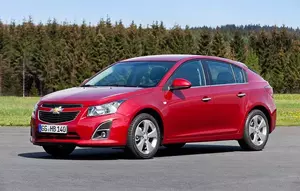
| Vehicle | Curb weight | Difference from world's smallest | Weight to power ratio | 0—60 mph acceleration ratio | Consumption ratio |
|---|---|---|---|---|---|
| 1.4 Turbo |
1323 kg / 2917 lbs |
898 kg (1980 lbs) heavier | 9 kg to 1 hp | - | - |
| Premier 1.4 Turbo |
1351 kg / 2979 lbs |
926 kg (2042 lbs) heavier | 9 kg to 1 hp | - | - |
| Vehicle | 1.4 Turbo |
|---|---|
| Curb weight |
1323 kg / 2917 lbs |
| Difference from world's smallest | 898 kg (898 lbs) heavier |
| Weight to power ratio | 9 kg to 1 hp |
| 0—60 mph acceleration ratio | - |
| Consumption ratio | - |
| Vehicle | Premier 1.4 Turbo |
| Curb weight |
1351 kg / 2979 lbs |
| Difference from world's smallest | 926 kg (926 lbs) heavier |
| Weight to power ratio | 9 kg to 1 hp |
| 0—60 mph acceleration ratio | - |
| Consumption ratio | - |

| Vehicle | Curb weight | Difference from world's smallest | Weight to power ratio | 0—60 mph acceleration ratio | Consumption ratio |
|---|---|---|---|---|---|
| 1.4 Turbo |
1302 kg / 2871 lbs |
877 kg (1934 lbs) heavier | 9 kg to 1 hp | - | - |
| Premier 1.4 Turbo |
1356 kg / 2990 lbs |
931 kg (2053 lbs) heavier | 9 kg to 1 hp | - | - |
| Vehicle | 1.4 Turbo |
|---|---|
| Curb weight |
1302 kg / 2871 lbs |
| Difference from world's smallest | 877 kg (877 lbs) heavier |
| Weight to power ratio | 9 kg to 1 hp |
| 0—60 mph acceleration ratio | - |
| Consumption ratio | - |
| Vehicle | Premier 1.4 Turbo |
| Curb weight |
1356 kg / 2990 lbs |
| Difference from world's smallest | 931 kg (931 lbs) heavier |
| Weight to power ratio | 9 kg to 1 hp |
| 0—60 mph acceleration ratio | - |
| Consumption ratio | - |

| Vehicle | Curb weight | Difference from world's smallest | Weight to power ratio | 0—60 mph acceleration ratio | Consumption ratio |
|---|---|---|---|---|---|
| 1.4 |
1312 kg / 2893 lbs |
887 kg (1956 lbs) heavier | 8 kg to 1 hp | - |
173 kg/L (381 lbs/L) |
| 1.6 TD |
1464 kg / 3228 lbs |
1039 kg (2291 lbs) heavier | 11 kg to 1 hp | - | - |
| Premier 1.4 Turbo |
1351 kg / 2979 lbs |
926 kg (2042 lbs) heavier | 9 kg to 1 hp | - | - |
| Vehicle | 1.4 |
|---|---|
| Curb weight |
1312 kg / 2893 lbs |
| Difference from world's smallest | 887 kg (887 lbs) heavier |
| Weight to power ratio | 8 kg to 1 hp |
| 0—60 mph acceleration ratio | - |
| Consumption ratio |
173 kg/L (381 lbs/L) |
| Vehicle | 1.6 TD |
| Curb weight |
1464 kg / 3228 lbs |
| Difference from world's smallest | 1039 kg (1039 lbs) heavier |
| Weight to power ratio | 11 kg to 1 hp |
| 0—60 mph acceleration ratio | - |
| Consumption ratio | - |
| Vehicle | Premier 1.4 Turbo |
| Curb weight |
1351 kg / 2979 lbs |
| Difference from world's smallest | 926 kg (926 lbs) heavier |
| Weight to power ratio | 9 kg to 1 hp |
| 0—60 mph acceleration ratio | - |
| Consumption ratio | - |

| Vehicle | Curb weight | Difference from world's smallest | Weight to power ratio | 0—60 mph acceleration ratio | Consumption ratio |
|---|---|---|---|---|---|
| 1.4 |
1286 kg / 2836 lbs |
861 kg (1899 lbs) heavier | 8 kg to 1 hp | - |
176 kg/L (388 lbs/L) |
| 1.6 TD |
1402 kg / 3091 lbs |
977 kg (2154 lbs) heavier | 10 kg to 1 hp | - | - |
| Vehicle | 1.4 |
|---|---|
| Curb weight |
1286 kg / 2836 lbs |
| Difference from world's smallest | 861 kg (861 lbs) heavier |
| Weight to power ratio | 8 kg to 1 hp |
| 0—60 mph acceleration ratio | - |
| Consumption ratio |
176 kg/L (388 lbs/L) |
| Vehicle | 1.6 TD |
| Curb weight |
1402 kg / 3091 lbs |
| Difference from world's smallest | 977 kg (977 lbs) heavier |
| Weight to power ratio | 10 kg to 1 hp |
| 0—60 mph acceleration ratio | - |
| Consumption ratio | - |

| Vehicle | Curb weight | Difference from world's smallest | Weight to power ratio | 0—60 mph acceleration ratio | Consumption ratio |
|---|---|---|---|---|---|
| 1.6 |
1360 kg / 2999 lbs |
935 kg (2062 lbs) heavier | 11 kg to 1 hp | 113 kg/s (249 lbs/s) |
213 kg/L (470 lbs/L) |
| 1.8 |
1400 kg / 3087 lbs |
975 kg (2150 lbs) heavier | 10 kg to 1 hp | 128 kg/s (282 lbs/s) |
209 kg/L (461 lbs/L) |
| 1.4 |
1340 kg / 2955 lbs |
915 kg (2018 lbs) heavier | 13 kg to 1 hp | 96 kg/s (212 lbs/s) |
235 kg/L (518 lbs/L) |
| 1.7 TD |
1475 kg / 3252 lbs |
1050 kg (2315 lbs) heavier | 11 kg to 1 hp | 149 kg/s (329 lbs/s) |
328 kg/L (723 lbs/L) |
| 1.4 Turbo |
1405 kg / 3098 lbs |
980 kg (2161 lbs) heavier | 10 kg to 1 hp | 156 kg/s (344 lbs/s) |
242 kg/L (534 lbs/L) |
| 2.0 TD |
1539 kg / 3393 lbs |
1114 kg (2456 lbs) heavier | 9 kg to 1 hp | 162 kg/s (357 lbs/s) |
265 kg/L (584 lbs/L) |
| Vehicle | 1.6 |
|---|---|
| Curb weight |
1360 kg / 2999 lbs |
| Difference from world's smallest | 935 kg (935 lbs) heavier |
| Weight to power ratio | 11 kg to 1 hp |
| 0—60 mph acceleration ratio | 113 kg/s (249 lbs/s) |
| Consumption ratio |
213 kg/L (470 lbs/L) |
| Vehicle | 1.8 |
| Curb weight |
1400 kg / 3087 lbs |
| Difference from world's smallest | 975 kg (975 lbs) heavier |
| Weight to power ratio | 10 kg to 1 hp |
| 0—60 mph acceleration ratio | 128 kg/s (282 lbs/s) |
| Consumption ratio |
209 kg/L (461 lbs/L) |
| Vehicle | 1.4 |
| Curb weight |
1340 kg / 2955 lbs |
| Difference from world's smallest | 915 kg (915 lbs) heavier |
| Weight to power ratio | 13 kg to 1 hp |
| 0—60 mph acceleration ratio | 96 kg/s (212 lbs/s) |
| Consumption ratio |
235 kg/L (518 lbs/L) |
| Vehicle | 1.7 TD |
| Curb weight |
1475 kg / 3252 lbs |
| Difference from world's smallest | 1050 kg (1050 lbs) heavier |
| Weight to power ratio | 11 kg to 1 hp |
| 0—60 mph acceleration ratio | 149 kg/s (329 lbs/s) |
| Consumption ratio |
328 kg/L (723 lbs/L) |
| Vehicle | 1.4 Turbo |
| Curb weight |
1405 kg / 3098 lbs |
| Difference from world's smallest | 980 kg (980 lbs) heavier |
| Weight to power ratio | 10 kg to 1 hp |
| 0—60 mph acceleration ratio | 156 kg/s (344 lbs/s) |
| Consumption ratio |
242 kg/L (534 lbs/L) |
| Vehicle | 2.0 TD |
| Curb weight |
1539 kg / 3393 lbs |
| Difference from world's smallest | 1114 kg (1114 lbs) heavier |
| Weight to power ratio | 9 kg to 1 hp |
| 0—60 mph acceleration ratio | 162 kg/s (357 lbs/s) |
| Consumption ratio |
265 kg/L (584 lbs/L) |

| Vehicle | Curb weight | Difference from world's smallest | Weight to power ratio | 0—60 mph acceleration ratio | Consumption ratio |
|---|---|---|---|---|---|
| 1.4 |
1305 kg / 2878 lbs |
880 kg (1941 lbs) heavier | 13 kg to 1 hp | 97 kg/s (214 lbs/s) |
242 kg/L (534 lbs/L) |
| 1.7 TD |
1429 kg / 3151 lbs |
1004 kg (2214 lbs) heavier | 11 kg to 1 hp | 147 kg/s (324 lbs/s) |
318 kg/L (701 lbs/L) |
| 1.4 Turbo |
1350 kg / 2977 lbs |
925 kg (2040 lbs) heavier | 10 kg to 1 hp | 135 kg/s (298 lbs/s) |
211 kg/L (465 lbs/L) |
| 2.0 TD |
1510 kg / 3330 lbs |
1085 kg (2393 lbs) heavier | 9 kg to 1 hp | 168 kg/s (370 lbs/s) |
260 kg/L (573 lbs/L) |
| Vehicle | 1.4 |
|---|---|
| Curb weight |
1305 kg / 2878 lbs |
| Difference from world's smallest | 880 kg (880 lbs) heavier |
| Weight to power ratio | 13 kg to 1 hp |
| 0—60 mph acceleration ratio | 97 kg/s (214 lbs/s) |
| Consumption ratio |
242 kg/L (534 lbs/L) |
| Vehicle | 1.7 TD |
| Curb weight |
1429 kg / 3151 lbs |
| Difference from world's smallest | 1004 kg (1004 lbs) heavier |
| Weight to power ratio | 11 kg to 1 hp |
| 0—60 mph acceleration ratio | 147 kg/s (324 lbs/s) |
| Consumption ratio |
318 kg/L (701 lbs/L) |
| Vehicle | 1.4 Turbo |
| Curb weight |
1350 kg / 2977 lbs |
| Difference from world's smallest | 925 kg (925 lbs) heavier |
| Weight to power ratio | 10 kg to 1 hp |
| 0—60 mph acceleration ratio | 135 kg/s (298 lbs/s) |
| Consumption ratio |
211 kg/L (465 lbs/L) |
| Vehicle | 2.0 TD |
| Curb weight |
1510 kg / 3330 lbs |
| Difference from world's smallest | 1085 kg (1085 lbs) heavier |
| Weight to power ratio | 9 kg to 1 hp |
| 0—60 mph acceleration ratio | 168 kg/s (370 lbs/s) |
| Consumption ratio |
260 kg/L (573 lbs/L) |

| Vehicle | Curb weight | Difference from world's smallest | Weight to power ratio | 0—60 mph acceleration ratio | Consumption ratio |
|---|---|---|---|---|---|
| 1.4 Turbo |
1345 kg / 2966 lbs |
920 kg (2029 lbs) heavier | 10 kg to 1 hp | 136 kg/s (300 lbs/s) |
213 kg/L (470 lbs/L) |
| 1.7 TD |
1425 kg / 3142 lbs |
1000 kg (2205 lbs) heavier | 11 kg to 1 hp | 150 kg/s (331 lbs/s) |
317 kg/L (699 lbs/L) |
| 2.0 TD |
1460 kg / 3219 lbs |
1035 kg (2282 lbs) heavier | 9 kg to 1 hp | 180 kg/s (397 lbs/s) |
304 kg/L (670 lbs/L) |
| Vehicle | 1.4 Turbo |
|---|---|
| Curb weight |
1345 kg / 2966 lbs |
| Difference from world's smallest | 920 kg (920 lbs) heavier |
| Weight to power ratio | 10 kg to 1 hp |
| 0—60 mph acceleration ratio | 136 kg/s (300 lbs/s) |
| Consumption ratio |
213 kg/L (470 lbs/L) |
| Vehicle | 1.7 TD |
| Curb weight |
1425 kg / 3142 lbs |
| Difference from world's smallest | 1000 kg (1000 lbs) heavier |
| Weight to power ratio | 11 kg to 1 hp |
| 0—60 mph acceleration ratio | 150 kg/s (331 lbs/s) |
| Consumption ratio |
317 kg/L (699 lbs/L) |
| Vehicle | 2.0 TD |
| Curb weight |
1460 kg / 3219 lbs |
| Difference from world's smallest | 1035 kg (1035 lbs) heavier |
| Weight to power ratio | 9 kg to 1 hp |
| 0—60 mph acceleration ratio | 180 kg/s (397 lbs/s) |
| Consumption ratio |
304 kg/L (670 lbs/L) |

| Vehicle | Curb weight | Difference from world's smallest | Weight to power ratio | 0—60 mph acceleration ratio | Consumption ratio |
|---|---|---|---|---|---|
| 2.0 TD |
1455 kg / 3208 lbs |
1030 kg (2271 lbs) heavier | 9 kg to 1 hp | 163 kg/s (359 lbs/s) |
231 kg/L (509 lbs/L) |
| 1.6 |
1360 kg / 2999 lbs |
935 kg (2062 lbs) heavier | 12 kg to 1 hp | 114 kg/s (251 lbs/s) |
200 kg/L (441 lbs/L) |
| 1.8 |
1315 kg / 2900 lbs |
890 kg (1963 lbs) heavier | 9 kg to 1 hp | 125 kg/s (276 lbs/s) |
185 kg/L (408 lbs/L) |
| 1.6 16V |
1285 kg / 2833 lbs |
860 kg (1896 lbs) heavier | 10 kg to 1 hp | 124 kg/s (273 lbs/s) |
198 kg/L (437 lbs/L) |
| 1.7 TD |
1425 kg / 3142 lbs |
1000 kg (2205 lbs) heavier | 11 kg to 1 hp | 150 kg/s (331 lbs/s) |
317 kg/L (699 lbs/L) |
| Vehicle | 2.0 TD |
|---|---|
| Curb weight |
1455 kg / 3208 lbs |
| Difference from world's smallest | 1030 kg (1030 lbs) heavier |
| Weight to power ratio | 9 kg to 1 hp |
| 0—60 mph acceleration ratio | 163 kg/s (359 lbs/s) |
| Consumption ratio |
231 kg/L (509 lbs/L) |
| Vehicle | 1.6 |
| Curb weight |
1360 kg / 2999 lbs |
| Difference from world's smallest | 935 kg (935 lbs) heavier |
| Weight to power ratio | 12 kg to 1 hp |
| 0—60 mph acceleration ratio | 114 kg/s (251 lbs/s) |
| Consumption ratio |
200 kg/L (441 lbs/L) |
| Vehicle | 1.8 |
| Curb weight |
1315 kg / 2900 lbs |
| Difference from world's smallest | 890 kg (890 lbs) heavier |
| Weight to power ratio | 9 kg to 1 hp |
| 0—60 mph acceleration ratio | 125 kg/s (276 lbs/s) |
| Consumption ratio |
185 kg/L (408 lbs/L) |
| Vehicle | 1.6 16V |
| Curb weight |
1285 kg / 2833 lbs |
| Difference from world's smallest | 860 kg (860 lbs) heavier |
| Weight to power ratio | 10 kg to 1 hp |
| 0—60 mph acceleration ratio | 124 kg/s (273 lbs/s) |
| Consumption ratio |
198 kg/L (437 lbs/L) |
| Vehicle | 1.7 TD |
| Curb weight |
1425 kg / 3142 lbs |
| Difference from world's smallest | 1000 kg (1000 lbs) heavier |
| Weight to power ratio | 11 kg to 1 hp |
| 0—60 mph acceleration ratio | 150 kg/s (331 lbs/s) |
| Consumption ratio |
317 kg/L (699 lbs/L) |

| Vehicle | Curb weight | Difference from world's smallest | Weight to power ratio | 0—60 mph acceleration ratio | Consumption ratio |
|---|---|---|---|---|---|
| 2.0 TD 16V |
1480 kg / 3263 lbs |
1055 kg (2326 lbs) heavier | 9 kg to 1 hp | 183 kg/s (404 lbs/s) |
264 kg/L (582 lbs/L) |
| 1.6 16V |
1305 kg / 2878 lbs |
880 kg (1941 lbs) heavier | 11 kg to 1 hp | 114 kg/s (251 lbs/s) |
198 kg/L (437 lbs/L) |
| 1.8 16V |
1319 kg / 2908 lbs |
894 kg (1971 lbs) heavier | 9 kg to 1 hp | 133 kg/s (293 lbs/s) |
178 kg/L (392 lbs/L) |
| 2.0 TD |
1510 kg / 3330 lbs |
1085 kg (2393 lbs) heavier | 9 kg to 1 hp | 162 kg/s (357 lbs/s) |
240 kg/L (529 lbs/L) |
| 1.8 |
1319 kg / 2908 lbs |
894 kg (1971 lbs) heavier | 9 kg to 1 hp | 133 kg/s (293 lbs/s) |
178 kg/L (392 lbs/L) |
| Vehicle | 2.0 TD 16V |
|---|---|
| Curb weight |
1480 kg / 3263 lbs |
| Difference from world's smallest | 1055 kg (1055 lbs) heavier |
| Weight to power ratio | 9 kg to 1 hp |
| 0—60 mph acceleration ratio | 183 kg/s (404 lbs/s) |
| Consumption ratio |
264 kg/L (582 lbs/L) |
| Vehicle | 1.6 16V |
| Curb weight |
1305 kg / 2878 lbs |
| Difference from world's smallest | 880 kg (880 lbs) heavier |
| Weight to power ratio | 11 kg to 1 hp |
| 0—60 mph acceleration ratio | 114 kg/s (251 lbs/s) |
| Consumption ratio |
198 kg/L (437 lbs/L) |
| Vehicle | 1.8 16V |
| Curb weight |
1319 kg / 2908 lbs |
| Difference from world's smallest | 894 kg (894 lbs) heavier |
| Weight to power ratio | 9 kg to 1 hp |
| 0—60 mph acceleration ratio | 133 kg/s (293 lbs/s) |
| Consumption ratio |
178 kg/L (392 lbs/L) |
| Vehicle | 2.0 TD |
| Curb weight |
1510 kg / 3330 lbs |
| Difference from world's smallest | 1085 kg (1085 lbs) heavier |
| Weight to power ratio | 9 kg to 1 hp |
| 0—60 mph acceleration ratio | 162 kg/s (357 lbs/s) |
| Consumption ratio |
240 kg/L (529 lbs/L) |
| Vehicle | 1.8 |
| Curb weight |
1319 kg / 2908 lbs |
| Difference from world's smallest | 894 kg (894 lbs) heavier |
| Weight to power ratio | 9 kg to 1 hp |
| 0—60 mph acceleration ratio | 133 kg/s (293 lbs/s) |
| Consumption ratio |
178 kg/L (392 lbs/L) |